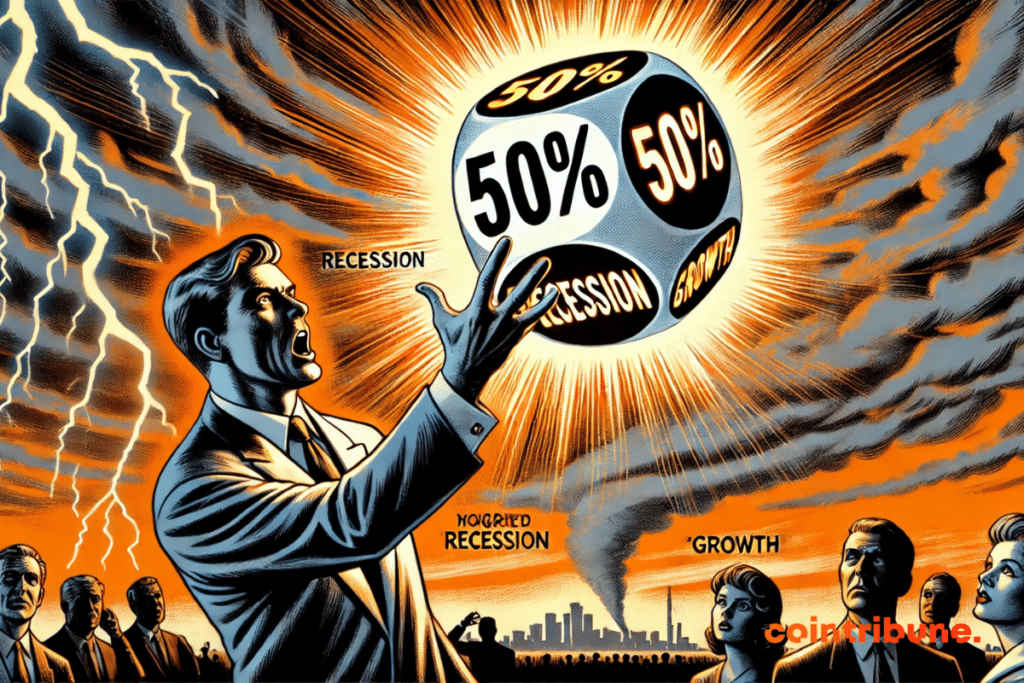Trump's Tariffs Raise The Risk Of Recession To 50%
The United States is making great strides on a tightrope between economic patriotism and budgetary reality. As Donald Trump puts on his boxing gloves, the financial world straightens up in its chair. It must be said that the “Day of Liberation,” adorned with its new tariffs, resembled more a declaration of trade war than a celebration of economic independence. And amidst this cacophony of numbers and announcements, a question begins to be heard, softly but firmly: will the world’s largest economy falter?

The announcement of new tariffs increases the risk of recession according to Polymarket
Since Trump’s announcements, the spotlight has been on the immediate reaction of the markets. Polymarket, an alternative but revealing barometer of investors’ psychological state, now shows 50% probability of recession. And this probability is nothing but a simple number thrown into the air: it reflects deep concerns about the economic impact of this aggressive trade policy.
For the crypto market, this raises a burning question: can the bitcoin bull run survive such a macroeconomic confidence shock?
The trading floors trembled. The Nasdaq retreated, bitcoin wavered. And as safe haven assets took over, a shiver ran down investors’ spines.
America’s protectionism has resurfaced, more assertive, sharper.
Half a century earlier, Ronald Reagan began his presidency amid an economic storm. A violent recession, followed by a spectacular recovery. In a video shared by Bannon’s War Room, Jim Rickards revives this memory:
In Reagan’s first two years, we experienced the worst recession since the Great Depression. The American economy emerged with 16% real growth.
The comparison is made, barely veiled. For Trump’s supporters, the current economic chaos would be the necessary prelude to a similarly historic rebound — and the pain, a necessary step towards rebirth.
- 50% probability of recession estimated by Polymarket.
- Tariffs deemed more aggressive than expected.
- Immediate impact on stock indices and bitcoin.
Goldman Sachs raises the risk of recession to 35% due to trade tensions
On the institutional side, the tone is more muted, but the words do not lie. Goldman Sachs, rarely prone to alarmism, raises its recession forecast: 35% risk within the next 12 months. A symbolic threshold, almost a siren.
Because if finance begins to lose confidence, the rest of the economy could follow.
The economists at the bank wield three red flags as evidence: stagnant real incomes, declining consumption, and soaring inflation fueled by trade tensions.
- Recession probability raised to 35%.
- Inflation forecast at 3.5% by the end of 2025.
- Consumption and incomes in decline.
These data may not be spectacular alone, but combined, they paint a much darker picture. In a country where consumption drives the economic engine, even the slightest slowdown in the average basket can tip the balance.
And while economic signals blink, some remind that the alert had been given long before. Victor Shi shares a statement from Kamala Harris dating back to September 2024:
What Goldman Sachs says is that the economy would be worse under Donald Trump.
And now yesterday, the bank raises its recession forecast. For skeptics of protectionist supply, the loop is closed. What some saw as a political prediction becomes, through the numbers, a diagnosis.
Can American markets really avoid recession? That’s the question hanging in the air, like a cloud no one wants to name. Between the intuitions of predictive platforms, warnings from investment banks, and electoral tensions, the atmosphere is charged with electricity. And in this unstable environment, it won’t take much to make the storm break.
Maximize your Cointribune experience with our "Read to Earn" program! For every article you read, earn points and access exclusive rewards. Sign up now and start earning benefits.
La révolution blockchain et crypto est en marche ! Et le jour où les impacts se feront ressentir sur l’économie la plus vulnérable de ce Monde, contre toute espérance, je dirai que j’y étais pour quelque chose
The views, thoughts, and opinions expressed in this article belong solely to the author, and should not be taken as investment advice. Do your own research before taking any investment decisions.